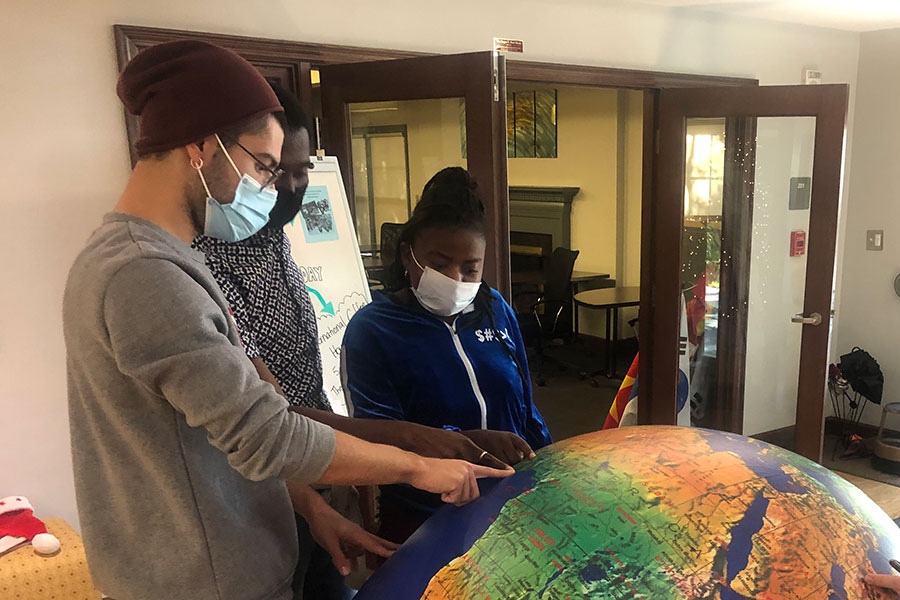
Most of the students who enter the Center for Intensive English Studies at Florida State University for the first time speak no English.
It’s a point of pride for those at the institute that in one year those same students not only read, write, and interact in English at the graduate level, but are equipped with knowledge that goes beyond English.
The journey between that first day and the subsequent 12 months is shaped by what happens inside and outside of the center’s classrooms, said CIES Director Patrick Kennell.
Kennell said CIES attracts students from around the world. For many of them, it’s the first step in their pursuit of a graduate degree. They need to learn English but that’s just a start.
“So many of our students have not been to the United States before or even out of their home country until they come here,” Kennell said. “Customs and cultural norms are also part of what they need to get acquainted with.”
CIES offers a handful of programs and certifications. Two of the most popular are the Intensive English Program, which helps students prepare for success at an American university, and English for Academic Purposes, which prepares students to serve as teaching assistants and teach undergraduates at FSU. Cumulatively, the center serves about 150 students per semester.
From its basement kitchen to its numerous lounges, CIES offers students the opportunity for an intense experience with language, as well as a chance to become part of a community through which culture is shared and bonds are forged.
It’s in spaces like the kitchen that students learn conversational language and the idioms, cliches and references that most English-speaking Americans use reflexively. Those same nuances can confuse those who interpret them literally or lack context.
To bridge that divide, no tools are off limits.
“We use dad jokes a lot,” Kennell said with a laugh. “Just silly puns and things of that nature to help show students those parts of English we use all the time, like expressions that aren’t literal.”
Behind Kennell there was a sign featuring “Halloween Dad Jokes.”
“Why didn’t the skeleton cross the street?” it asks.
“It didn’t have any guts.”
Below the text is an expanded explanation: “Guts has two meanings in English. Guts = intestines. Guts = courage or bravery.”
“You had guts to come to the United States to study English,” it concludes.
Ana Gutierrez, a student from Bolivia, said it’s these touches that help CIES open doors to the world that were previously closed.
“I was a girl who hated taking English classes at school but later I wanted to know the world, and English is considered the world’s language, so I had to learn it,” she said. “During the first session that I took at CIES, I fell in love.”
Anuar Jaffeth Lengua, who is from Colombia, said CIES was a monumental experience for him and his classmates.
“Despite our different backgrounds, we came to the same place for similar purposes,” he said. “It makes you realize we all have similar hopes and wishes, independently of where we come from. That realization makes you feel part of something bigger and that no matter who I meet, I can find people who I can get along and sympathize with.”
Lengua added: “If you look deeper, we are all the same. This may not sound like an outstanding discovery and rather something I should already know, but there is a difference between knowing and understanding. Understanding can only come from experience.”
While forging friendships, the students also learn from each other and break down cultural barriers.
“I can literally say that at CIES I met a new world, but I also brought this new world along to meet my world in Turkey,” said Pinar Ackay, who is studying English to further her career in international marketing. “Some people at CIES didn’t know about Turkey or had wrong ideas. One day, my Colombian friend asked about camels in Turkey. I haven’t even seen a camel in my entire life. Other people assumed that our alphabet was in Arabic letters.”
Ackay added: “CIES has been a great chance to introduce my country Turkey to my new friends.”
Other countries currently represented by CIES students include Bolivia, Dominican Republic, South Korea, Burkina Faso, Ivory Coast, Colombia, China and Peru.
Kennell said that FSU benefits greatly from such diversity on campus. FSU students who are not able to study abroad are still able to connect with students from all over the world right here on campus and that fosters global-ready graduates.
FSU’s climb up the national college rankings lists has raised its global profile and increased interest from international students. Kennell said that increased interest feeds a substantial economic benefit to the U.S. economy.
The National Association of International Educators estimates that international students studying at U.S. colleges and universities contributed $38.7 billion and supported 416,000 jobs in the U.S. economy in the 2019-2020 academic year.
“We like to say CIES is ‘where the world comes to learn English,’” Kennel said. “That has a very real benefit to everyone.”
For more information visit, https://cies.fsu.edu
"center" - Google News
November 16, 2021 at 01:17AM
https://ift.tt/3chhnry
Benefits of Center for Intensive English Studies center go beyond language at FSU - Florida State News
"center" - Google News
https://ift.tt/3bUHym8
https://ift.tt/2zR6ugj
Bagikan Berita Ini














0 Response to "Benefits of Center for Intensive English Studies center go beyond language at FSU - Florida State News"
Post a Comment